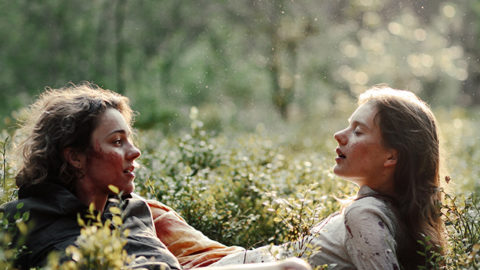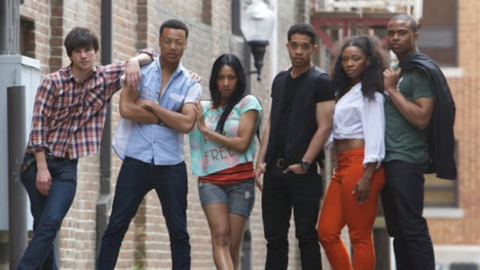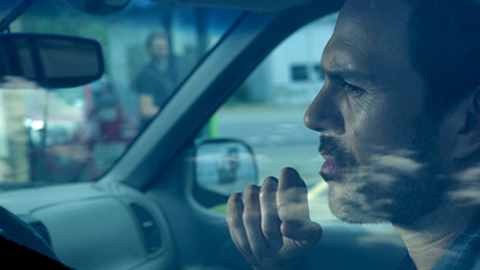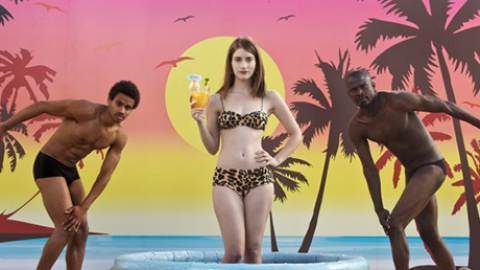Festivals: NewFest 2016
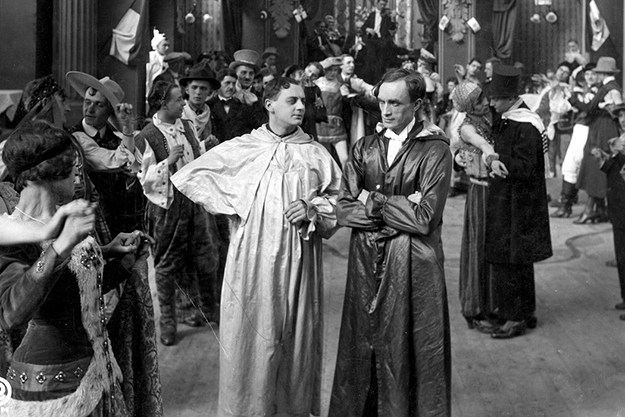
Different From the Others
“What matters now is to restore honor and justice to the many thousands before us, with us, and after us.” With such powerful language about equality, its recovered history, its potent timeliness, and its imagined future, Richard Oswald wrapped up what would become the first film to deal explicitly and sympathetically with homosexuality: 1919’s Different from the Others. A new 35mm print of the silent film, which was co-written by renowned sexologist Dr. Magnus Hirschfeld, who’d published a treatise on sexual minorities at the turn of the last century, serves as the centerpiece to this year’s NewFest, New York City’s premier LGBT film festival.
At once a narrative about same-sex desire and an anti-homophobia piece of agit-prop responding to Germany’s criminalization of homosexuality, Different from the Others cannot help but feel like an enduring template for the many films that have followed in its wake. Yet the films at this year’s festival seemed intent on downplaying the didacticism of their own stories, privileging personal stories that revel in ambiguity, shying away from if not outright dispensing with labels and rigid notions of sexual and gender identities. Furthermore, the absence of tidily wrapped-up happy endings in the selection feels like an acknowledgment that the burden of representation is not as heavy as it used to be, with melancholy finally allowed to linger in LGBT stories without it somehow standing in for narrative judgments on its characters.
One salient exception is the fest’s opening film, Ben A. Williams’ The Pass, which tackles the spectre of closeted homosexuality in the world of sports with aplomb, grounding it in a carefully choreographed character study. Adapting his own three-act play about a closeted soccer player, screenwriter John Donnelly has kept its structure intact. We meet Jason (an electric Russell Tovey) in his skivvies as he shares a high-end hotel room with fellow soccer player Ade (Arinze Kene). They’re eager to hit the ground running the next day in what’ll prove to be a pivotal match for their careers. When conversation veers uncomfortably into “locker room talk” and as their roughhousing becomes unexpectedly intimate, the push and pull of Donnelly’s quick-witted dialogue leaves the two young men at a loss for what may yet happen once the camera leaves them alone, naked in the shower. The next two sections of the film (set in different hotel rooms) pick up five years later, and then 10 years later. They invite us to see what’s become of Jason, now one of the most successful (if PR-embattled) soccer players in the world. With echoes of Patrick Marber and Edward Albee, and true to its stage origins, The Pass remains a claustrophobic affair, a ticking time bomb of a two-hander that despite its monologue-heavy scenes crackles on the strength of Tovey’s manic and sexy performance.

Departure
Where The Pass is a jolt of energy, Andrew Steggall’s Departure is a tranquil affair, one as restrained and ethereal as the would-be young writer at its center. Elliot, a dreamy-eyed Alex Lawther, is prone to wearing a vintage military-style jacket that makes him look like an outsized toy soldier; the young boy is an English outsider in a small French town where he spends his days helping his mother pack up the house they’re about to sell, trying to write what might be a poem or a play (he’s still unsure), and slowly getting to know Clément (Phénix Brossard), the handsome young man who’s intent on fixing up a motorbike he’ll use to go see his dying mother again. Wishing to divorce himself from the family drama that has left his mother in a constantly neurotic state, Elliot finds refuge in the glinting verdant outdoors that he explores with his new friend. Elliot’s fixation on his newfound friend is undeniable. So much so that the rugged French boy keeps taunting and inciting him in equal measure. “You like me, no?” he asks Elliot. “Maybe my arse,” he adds when the other demurs. Precious almost to a fault, Steggall’s film is best when it zeroes in on Elliot’s budding desire (in particular in the one lakeside scene where his lust leads to a wordless moment of shared erotic release with Clément), less so when it tries to square this with the strident domestic drama at home which almost seems to belong to an entire different movie.
Equally attuned to the smallest of gestures and even more openly concerned with the quiet moments of intimacy between its characters is So Yong Kim’s Lovesong. The lyrics to the song (“Broken Hearted Love Song” by the Shoe) that closes out the film aptly sum up the relationship between longtime friends Sarah (Riley Keough) and Mindy (Jena Malone): “the only thing the heart craves is what’s been left unsaid and our bodies speak in volumes in and out of bed.” We first meet Sarah as she struggles with parenting her three year-old girl while her husband is constantly away. A road trip with her friend Mindy promises a respite. During this first section of the film, Kim’s camera, which captures Malone and Keough’s furtive glances at one another, lingering on moments that suggest their tentative attraction to one another, makes it feel like we’re constantly eavesdropping on a conversation too fragile to be put to words. Once things get physical one drunken night, Mindy leaves her friend behind, abruptly cutting short their trip with a recklessness that defines her bleach-blond character. When we see them again, three years later at Mindy’s wedding, their relationship remains frayed at the edges. Again, the film lets their scenes (at an awkward rehearsal dinner, at a laughable bachelorette party, in the woods hours before the ceremony) ebb and flow with a patience that suggests it’s not really interested in the will-they-or-won’t-they narrative but in capturing the pregnant pauses between them. As an exercise in intimacy it is an admirable attempt at fending off identity politics (particularly in its ambiguous and intentionally unsatisfying conclusion) though it oftentimes languishes too much for its own good, making its meditative sensibility at times feel catatonic.
Anna Muylaert’s Don’t Call Me Son finds the director of The Second Mother revisiting issues of class within another drama about family dynamics. The movie begins with a bombshell revelation: 18-year-old Pierre (Naomi Nero) learns that he was stolen from his family when he was a baby. The woman who raised him is not his biological mother and, after she’s sent to jail, he’s introduced to his “real” family, a wealthy couple with a young teenage son, who immediately take him in, happy to have finally found him. As its title suggests, Don’t Call Me Son hinges on Pierre’s discomfort within his newfound family unit, a clash that’s made all the more explosive by his own increasingly emboldened attempts at doing away with rigid gender norms. What had first been a dirty secret revealed only in the privacy of bathrooms (where he posed in female lingerie and makeup for provocative selfies) slowly becomes one way for him to push back against the bourgeois values of his new parents. Muylaert’s empathetic portrayal of Pierre, who bravely if nonchalantly wears a dress to a family bowling outing, and is as cavalier when having sex with a girl as he is when he makes out with a boy, moves the film away from the soap opera template that its synopsis cannot help but conjure up. What emerges is a humane portrait of teenage angst that’s also a surprising recasting of a nature versus nurture argument as attuned to class as it is to gender and sexuality.
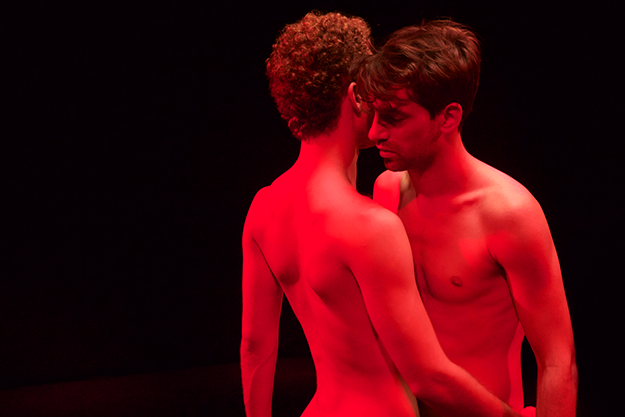
Paris 05:59: Theo & Hugo
The sex scenes that are so crucial yet so obliquely presented in the films above (at best offering a quick glimpse of bare male buttocks) are put to shame in what has to be the fest’s most erotically charged entry. Paris 05:59: Theo & Hugo opens at a Parisian gay sex club. For 18 uninterrupted minutes (the film takes place in real-time), directors Olivier Ducastel and Jacques Martineau offer a smorgasbord of lithe and lustful male bodies. Bathed appropriately in red-tinted light and not shying away from full frontal nudity, it is here where we first meet the eponymous couple who clock eyes and lock lips while separately fucking other guys. There’s a bravura to this explicit opening scene which offers up Theo’s and Hugo’s bodies for us to ogle in ways that make us less spectators than fellow late night cruisers. By the time the besotted couple leaves the club to have a romantic early morning stroll around the street-lit city and Hugo tells Theo that his dick is beautiful (“A guy’s dick is so important,” he tells him, “I think you can fall in love with a guy’s dick”) the coy compliment further energizes the palpable chemistry between the two. Beginning with the intimacy of sex, rather than proceeding towards it, is Ducastel and Martineau’s greatest gamble. It’s one that pays off once the film settles into its Before Sunset mode. And lest the film be accused of echoing and reclaiming a sexually liberated pre-AIDS sensibility and ignoring the very real side effects of Hugo and Theo’s freewheeling encounter, Paris 05:59 turns its post-coital narrative into an extended dialogue about safe sex, at once demystifying and strengthening the love-at-first-sight connection between the two beautiful young men.



